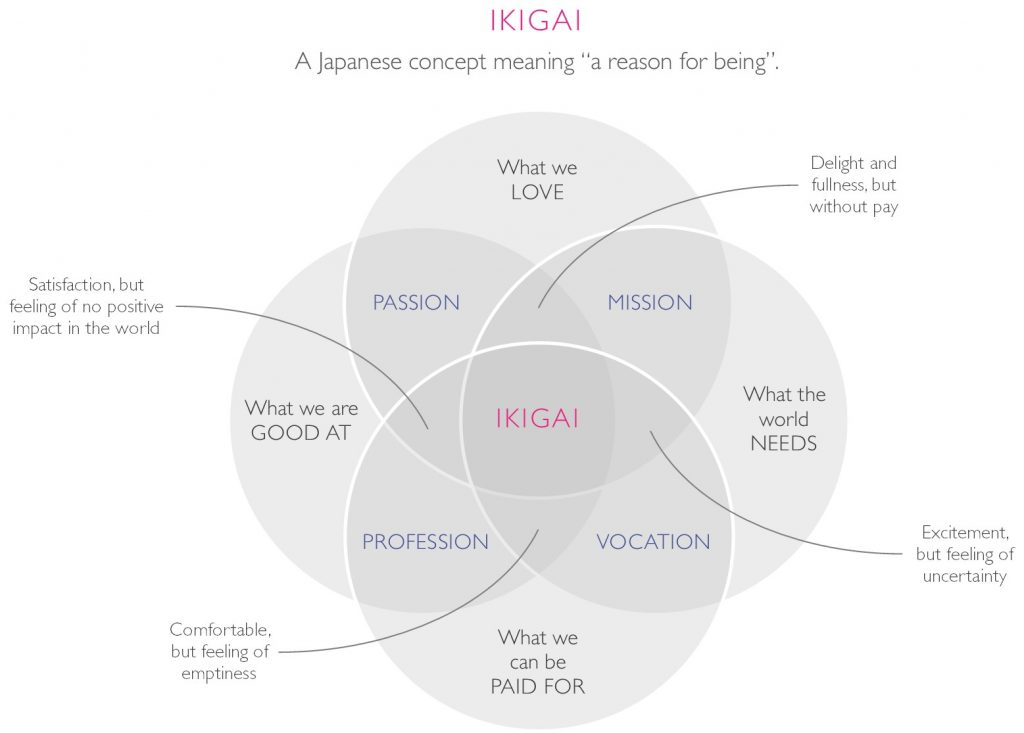I love Venn diagrams. They illustrate the differences, similarities and overlapping relationships between various groups or sets of concepts, elements, data, items etc. So when I came across a Venn diagram illustrating the Japanese concept of “ikigai”, I took immediate interest in it. Why? Because it encapsulates the concept behind Working Eye quite beautifully.
What is ikigai?
Ikigai [ ee-kee-gahy ] ![]() is an old Japanese ideology that combines the Japanese words “iki” (生き), which means “life,” and “gai” (甲斐), which is used to describe value or worth. So ikigai is your reason for being. It is your direction or purpose in life. Your ikigai is what gets you up every morning and keeps you going. Achieving your ikigai can, arguably, be done when you manage to combine what you love in life with what you’re good at, what the world needs, and carve a career out of it. Where there’s a happy marriage between your passion, mission, profession and vocation.
is an old Japanese ideology that combines the Japanese words “iki” (生き), which means “life,” and “gai” (甲斐), which is used to describe value or worth. So ikigai is your reason for being. It is your direction or purpose in life. Your ikigai is what gets you up every morning and keeps you going. Achieving your ikigai can, arguably, be done when you manage to combine what you love in life with what you’re good at, what the world needs, and carve a career out of it. Where there’s a happy marriage between your passion, mission, profession and vocation.

How can Working Eye help people achieve their ikigai?
The Working Eye Career Discovery Platform is an AI-driven approach to careers education, information, advice and guidance (CEIAG). The AI, Deep Learning processes and big data within the platform allows for a career discovery path that is non-linear, non-hierarchical, not static and never out of date. The Working Eye Career Discovery Platform therefore approaches CEIAG from a new angle and is truly focussed on the individual. What this means in practical terms is this:
What we love
What motivates, stimulates and engages the user visiting the Working Eye Career Discovery Platform is the primary consideration of their journey. Driven by the power of cognitive chat, AI and Machine Learning, the system delves into the likes, dislikes, wants and desires of the individual. It does this, quite simply, by asking straightforward questions such as “what do you love doing?”, “what are you passionate about?” and so on. This may seem “fluffy”, but it can make a huge difference to the choices you make when it comes to work. For example, if you’re interested in engineering but also love the outdoors and being physically active, then the system takes this into account and might suggest mechanical engineering as a job option, as opposed to doing CAD design in an office.
Not sure what we mean? Then watch our short film below; it gives an insight into the life of a Mechanical Engineer and how to become one.
What we’re good at
The user’s own understanding of what they’re good at may be derived from exam results, such as GCSEs, A-levels etc. This academic knowledge is a great starting point – however, because the Working Eye Career Discovery Platform works multi-dimensionally, it also delves into other emotive and practical aspects of a user’s abilities that’s not so obvious or black-and-white. Someone could be good at science, but also great at “getting stuck in” or being a “people’s person”. These qualities are all processed in the system and help the user unearth and discover job options and career paths that truly matches what they’re good at with what makes them happy.
What the world needs
The world is ever-changing. Jobs that existed just a few years ago may not exist anymore; likewise, new jobs are cropping up all the time with new, fancy names and titles. How on earth does one keep up with it all? What search terms are we supposed to use when looking for job roles and career paths, when it’s constantly evolving?
The database of jobs and careers in the Working Eye platform is derived from the national careers database and other sources, with thousands of job listings, and it is updated in real-time. So, once the platform digests information on what the user is good at and what they love doing, it can start matching these qualities up with suitable job options.
What we can be paid for
Because the Working Eye Career Discovery Platform is linked to the national careers database, all the practical information such as average salary, typical hours, skills & knowledge, what to expect on a day-to-day basis, and the skills and knowledge needed is shared on this career discovery journey. Happiness may not be equated to money, but it sure helps us understand the practicalities of certain career choices we make in life.
So, back to ikigai and career discovery.
There is no prescriptive careers advice with Working Eye, but rather, it offers a unique journey through career choices, job options and the world of work through true discovery. Ask, learn and develop. Match your own unique skills, desires and aspirations against the attributes of jobs that might be considered. Surely that path is worth going down if it leads to ikigai?

Recent Comments